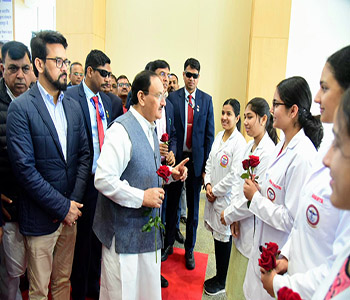Bilaspur: The inauguration of multiple state-of-the-art facilities at AIIMS Bilaspur by BJP stalwart Jagat Prakash Nadda and union health minister Mansukh Mandaviya has sparked a political firestorm, branding the event as a BJP affair.
The absence of any representation from the Sukhu-led Congress government has amplified concerns over federalism.
Nadda heralded the facilities as a milestone in healthcare infrastructure. He unveiled a high-capacity liquid medical oxygen plant and cutting-edge radiation therapy machinery.
He said the facility of liquid medical oxygen plant with a capacity of 40 thousand liters built at a cost of ₹ 4 crore has been inaugurated.
Similarly, in Radiation Oncology, modern machinery has been installed for advanced radiation therapy at a cost of ₹ 30 crore and CT scan facility has been started. He also laid the foundation stone of Vishram Sadan with a capacity of 350 beds that will give relief to the people of the state, Nadda said.
Nadda said new facilities run into crores will benefit the patients and underscored the BJP's commitment to bolstering healthcare services in India.
However, the conspicuous absence of Congress dignitaries has raised eyebrows, igniting debates over political inclusivity and the spirit of federal cooperation.
Critics argue that the event's overtly partisan undertones risk undermining the principles of cooperative governance, essential for fostering unity and progress.
Accompanied by Union IB Minister and Hamirpur MP, Anurag Singh Thakur, former CM Jai Ram Thakur and BJP chief Dr Rajeev Bindal, Nadda lavished accolades for Prime Minister Narendra Modi's leadership and the BJP's purported dedication to health advancement.
Nadda has hailed the strides made in combating tuberculosis (TB) under the leadership of Union Health Minister Mansukh Mandaviya.
Nadda commended the extensive efforts to disseminate TB information among the public and provide crucial medicines to those in need, resulting in an impressive 80% success rate in treatment.
Nadda emphasized a substantial expansion in infrastructure dedicated to combating drug-resistant strains. The number of centers has surged from 127 to a remarkable 792, signaling a robust commitment towards realizing India's vision of becoming TB-free.
Moreover, Nadda shed light on the remarkable transformation of India's healthcare landscape, citing a substantial surge in the number of medical colleges from 387 to 706.
This expansion isn't merely numerical; it's complemented by a significant increase in MBBS seats, soaring from 50 thousand to an impressive 1 lakh 8 thousand, he said.
This monumental progress underscores the government's dedication to bolstering healthcare infrastructure across the nation.
Engaging with medical students, Nadda stressed the pivotal role of student cooperation in serving humanity through effective policy implementation.
He advocated for coordination among faculty members, proposing reciprocal learning exchanges between AIIMS Bilaspur and Delhi.
Nadda reiterated the core ethos of AIIMS, encapsulated by the maxim, "Life will be lost, but life will be saved," underscoring the institution's unwavering commitment to patient care.
But absence of cross-party collaboration serves as a stark reminder of the deepening political fault lines as Lok Sabha Polls are coming closer.
As the nation gears up for crucial elections, the event's polarization reflects the intensifying battle lines between political parties, which are not being digested by the public batting for federalism.
While the BJP champions its achievements in healthcare infrastructure, the opposition's absence paints a picture of discord and political division.




